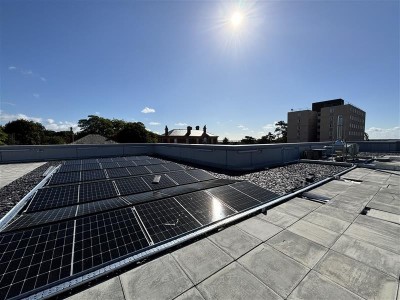Publish date: 28 April 2025

As part of this new funding Portsmouth Hospitals University NHS Trust (PHU) has been awarded £1,154,984 to install new solar panels on the roof of Queen Alexandra Hospital. Following the opening of its new Emergency Department in 2024, which has solar panels on the roof, this will be the second project on the site aimed at reducing energy costs and generating renewable energy.
These new solar panel installation projects are expected to deliver savings nationally of around £8.6 million a year, and up to £260 million over the panel’s lifetime across the NHS.
The funding awarded to PHU will not only help the Trust to deliver against its plans to be more sustainable by reducing emissions but will also deliver financial savings estimated to be around £215,000 a year. Work on the project has already begun and is due to be complete by Spring 2026.
Trevor Mose, Head of Sustainability and Energy at Portsmouth Hospitals University NHS Trust, said, “I am delighted we have been able to secure this funding to take forward a long-held aspiration to generate renewable electricity on site and support the growing demands of our clinical services. The benefits of this award will go some way to helping our ongoing work to reduce our impact on the environment. Thank you to everyone who has been involved in supporting us with it so far.”
Chief Sustainability Officer at NHS England, Chris Gormley said, “Thanks to the dedication of teams nationwide, the NHS has already implemented hundreds of projects that enhance energy efficiency and drive significant cost savings. This groundbreaking new investment, across 78 NHS Trusts on around 200 sites, will expand solar power generation within the NHS by over 300%, slashing energy costs by hundreds of millions of pounds. These vital savings can be reinvested directly into frontline care, ensuring the NHS continues to deliver for our patients and communities.”